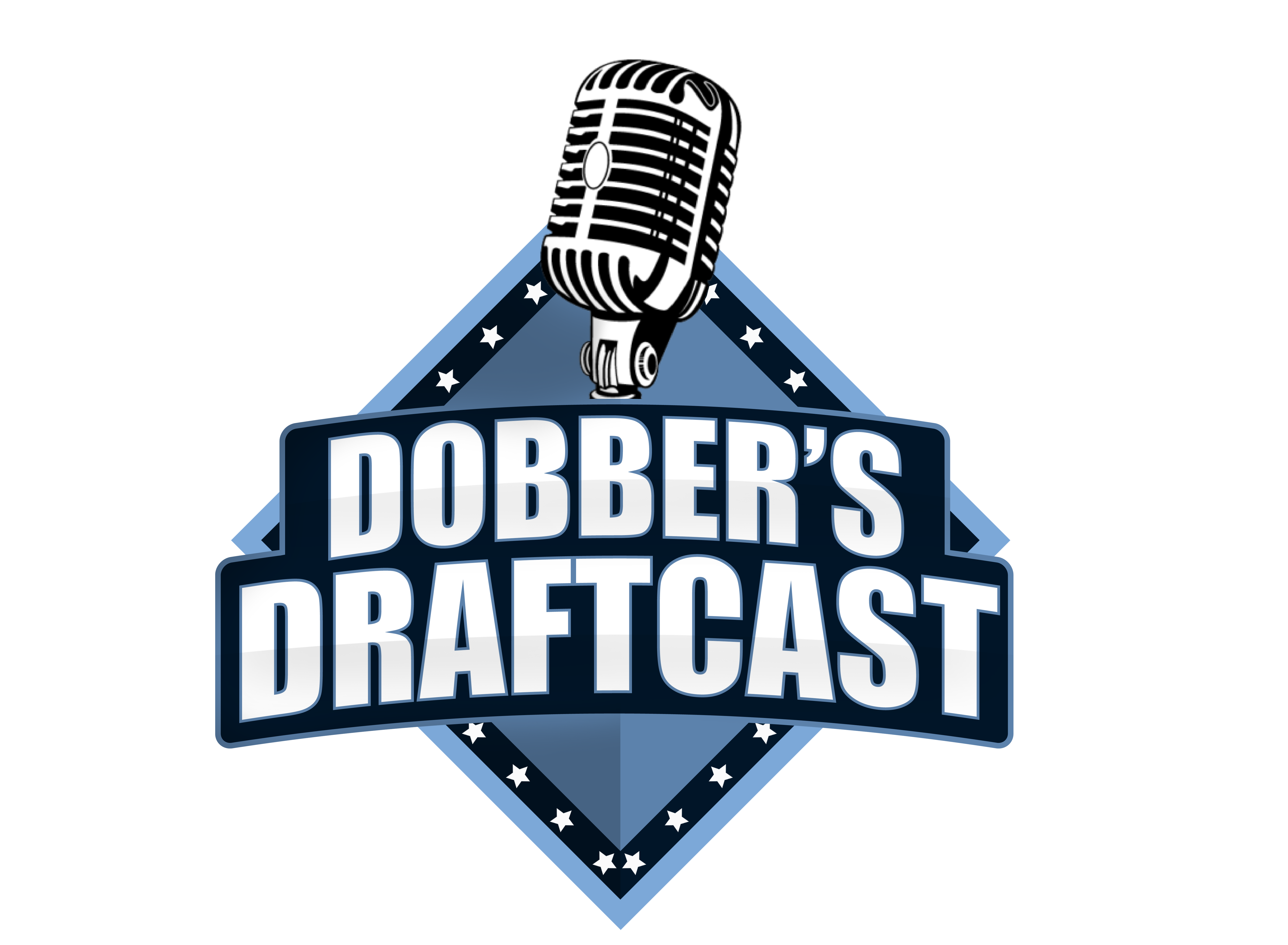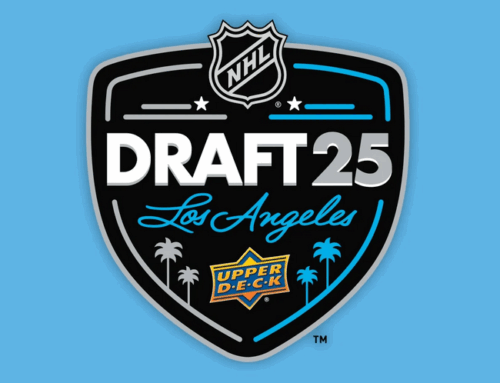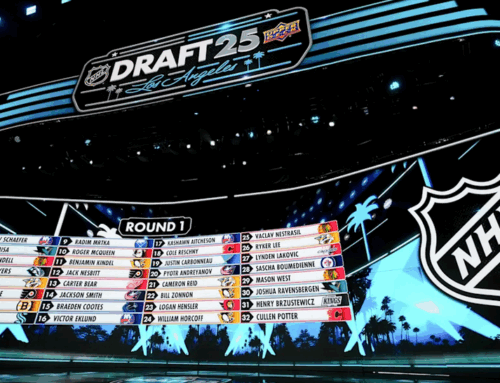Prospect Ramblings: Reviewing the NHL’s Preliminary Calder Votes
Hadi Kalakeche
2022-01-25
Welcome to my ramblings, where I’ll be writing down my thoughts on NHL and draft-eligible prospects once a week. I’ll be using the ramblings to keep you posted on the week’s events, or let you in on some questions I ask myself often regarding prospects, amateur scouting and player development.
First and foremost, an early simulation of the Calder trophy votes has been released by the NHL, featuring 16 writers from their website and based on a 5-4-3-2-1 voting system, similar to what will unfold at the end of the season but on a smaller scale. I wanted to take a look at the rankings and see where these players are likely to stand when the real thing goes down sometime in June.
Will Trevor Zegras (@tzegras11) alley-oop his way to Rookie of the Year? 👀👇
Read more! ➡️ https://t.co/UiLzQ3z5nw pic.twitter.com/3oAj9tqTpb
— NHL (@NHL) January 24, 2022
Starting with the player at the top:
Trevor Zegras, LW/C — Anaheim Ducks (67 votes)
According to the NHL’s website, seven of the 16 writers voted for Trevor Zegras as the league’s top rookie to date. With a total of 10 goals and 20 assists in 38 games so far, the Ducks’ rookie forward stands in second place for league-wide rookie scoring, as well as the second place on his own team’s scoring board behind the red-hot Troy Terry. In his first full season in the pros, Zegras has already turned some heads and ruffled a couple of feathers with his creative approach to the game. This highlight reel is the perfect example of that.
Trevor Zegras has been so fun to watch this season. I put together a compilation of my favorite plays so far. Must-see TV pic.twitter.com/pHgvi31sdd
— Brady Trettenero (@BradyTrett) December 8, 2021
When Zegras gets the puck, you can bet on it ending up on a Ducks player’s stick in the slot. There’s no telling how he’ll make it happen, however, which makes his passing game all the more effective. The amount of comfort with the puck it takes to be able to execute the moves he does at full speed, with his head up the whole time, makes it unsurprising that he’s emerged as the Calder favorite despite not leading the league’s rookies in points.
With both hands freed from his side, Zegras carries the puck in his hip pocket, ready to blend fakes into passes or shots, all while scanning the ice regularly. His arsenal of dekes seems endless, and he comes up with increasingly creative ideas in the heat of the moment, on the biggest stage in hockey. The Ducks are currently sitting at second in the Pacific division, and are outpacing their rebuild by a fair margin in part thanks to their 2019 ninth-overall pick’s emergence.
With the way Zegras has picked up his game as of late (25 points in his last 25 games) while receiving added ice-time and responsibilities, the prospect seems poised to take over the Ducks’ aging core and become the team’s lead man for the next decade or two.
Moritz Seider, RD — Detroit Red Wings (62 votes)
In second place, we find the only defenseman in this precocious top-four. Seider’s place in the mix is likely cemented at this point, as the rookie blueliner has earned an impressive 0.62 points per game played (three goals, 23 assists for 26 points in 42 games), which sits atop the leaderboard for first-year defensemen. He also leads all rookies in average time on ice with 22:30, which is second on the Red Wings behind Filip Hronek.
Seider’s maturity and his ability to dictate play as a 20-year-old in the NHL is something we haven’t seen in a long time; the rookie blueliners usually putting up these sorts of offensive numbers are often either two or three years older, and generally still have a lot to learn in their own zone. Seider breaks that rule, and does it with the confidence and poise of a 30-year-old.
Mo Seider said 'can you come here for a sec' pic.twitter.com/pAHMxerbEb
— Dimitri Filipovic (@DimFilipovic) January 4, 2022
Know any other 20-year-old defensemen who would have the gall to taunt an NHL forechecker into following them behind the net, let alone escape contact altogether with three quick strides when the player bites? I know I don’t.
(Granted, that’s fellow rookie Marian Studenic he drew in, but I’m not sure anyone would have gotten to that puck.)
He hasn’t hesitated so far to get his feet moving and break forechecking lines to carry the puck into the offensive zone, an area of his game that wasn’t entirely a strength heading into his draft year. His time spent in Grand Rapids and in Rögle was crucial in helping him create building blocks, blueprints for the defenseman he is shaping up to be. He’s still my pick for the Calder, but we’ll see how the rest of his season plays out.
Lucas Raymond, RW — Detroit Red Wings (59 votes)
What is there left to say about Raymond that hasn’t been said already? The NHL’s rookie points leader is now up to 33 points in 42 games, and despite cooling off in the last month (five points in 11 games since January 1st), he has remained firmly in the mix for the Calder trophy, mainly due to the fact that he is currently outpacing all three prospects taken ahead of him in the 2020 NHL Draft for points. In fact, he has one more point than first-overall pick Alexis Lafrenière, who has played 44 more games than Raymond.
The prospect’s dynamism with the puck makes him extremely difficult to contain, he can score from a multitude of areas, and has one of the most effective passing arsenals in the game. Raymond sneaks behind defenders’ heels to find soft ice, and loves to gain the middle off the boards, a skill that is hard to teach but so useful in finding extra seconds to work with.
Prior to Dylan Larkin’s OT winner, Lucas Raymond gave everyone a show with this toe drag backhand wrap-around attempt. #LGRW pic.twitter.com/zNDtFcSvs1
— everett (@borntodanhard) January 17, 2022
Proactive on loose pucks and dialed in like few players can be, Raymond displays tremendous play-reading and reactiveness, and can manipulate defenders’ feet effortlessly to open up lanes. The challenge for him will be to grab this team by the scruff of the neck and become its primary play-driver, as he often benefits from the skill of his linemates by trusting their ability to bring pucks to him in good areas, but getting more puck touches a shift will be imperative in building that up for the rookie winger.
Tanner Jeannot, LW/RW — Nashville Predators (23 votes)
At one point last year, Jeannot was plying his trade with the ECHL’s Florida Everblades. He started the year off with six points in his five games for the club, quickly earning a call-up to the AHL’s Chicago Wolves and putting up an impressive tally of 10 goals and 11 assists in only 13 games. Before long, the then-23-year-old was a regular on the Preds’ bottom-six, and earned five goals and two assists in his first 15 games of NHL action en route to a five-game playoff appearance.
This season, the prospect has settled in on the team’s third line but has played a decent amount on both special team units and even in overtime, scoring 13 goals and 12 assists for 25 points in 43 games so far this year. His 13 goals lead the entire 2021-2022 rookie class, and 12 of them have come at even-strength. He is riding a 20.5% shooting percentage which is more than likely to regress towards NHL average (10-11%), but his defensive game has been paramount to the Preds’ success and to his own offensive results.
Roman Josi feeds it to @Tanner_Jeannot for the @EASPORTSNHL OT winner! 🍎
Seven wins in a row for the @PredsNHL. pic.twitter.com/SDwfvvqIEE
— NHL (@NHL) December 18, 2021
Jeannot’s ability to drive the net and make himself available for set-ups or tip-ins, combined with his size and speed, have allowed him to score the same types of goals he’s been scoring at every level. Making himself a handful to defend has never been an issue for the Preds rookie, but the small elements that separate the good from the great aren’t as prevalent in his game. There isn’t much of an advanced thought process to his play with the puck, his give-and-go play isn’t as refined as Raymond’s and his pure skill isn’t as electrifying as Zegras’, but he fits his role perfectly and is doing a tremendous job of it, on top of having a heavy, well-disguised shot.
As a 24-year-old who is riding a high shooting percentage, I wouldn’t expect Jeannot to be in the conversation at the end of the season, but if he somehow keep up this impressive pace and even builds off of it, who knows?
The Best of the Rest
Anton Lundell, C — Florida Panthers (8 votes)
I was surprised to see Lundell get so few votes for the Calder. His 24 points in 38 games represent a higher per-game rate than Jeannot’s, and his play in every zone for the Panthers makes you forget at times that he’s 20 years old and playing his first year of North American hockey. Takeaways, stick checks, perfect system play, a heavy shot, great playmaking, there’s a lot to like about Lundell’s game.
Alex Nedeljkovic, G — Detroit Red Wings (7 votes)
The third Red Wing on this list, Ned’s play this year has proven that short goaltenders are often wrongly overlooked. After being acquired from the Canes for Jonathan Bernier and the 94th-overall pick in 2021 (Aidan Hreschuk), the 5-foot-11 netminder has done what he can with a rebuilding roster in front of him. He leads the league’s rookie netminders in wins (12), is fourth in save percentage (.915) and his 847 saves are almost 200 clear of his nearest competitor, Karel Vejmelka. Seriously, when Yzerman calls, you hang up.
Michael Bunting, C/W — Toronto Maple Leafs (5 votes)
The 26-year-old has dodged exemptions to rookie status like bullets in The Matrix — the criteria for eligibility are: under 26 years old as of Sep. 15th (Bunting turned 26 on Sep. 17th), played less than 26 games last season (he appeared in 21), and played less than six games in his last two NHL seasons (he played five in 2018-19). The Leafs’ offseason acquisition has the exact same stat line as Anton Lundell (9 goals, 15 assists in 38 games), but his age makes him hard to put in the same category as the other names.
Other marginal votes: Jamie Drysdale (4), Dawson Mercer (2), Seth Jarvis (2) Alexandre Carrier (1)
Thanks for reading — follow me on Twitter @HadiK_Scouting for all of your prospect-related needs!





